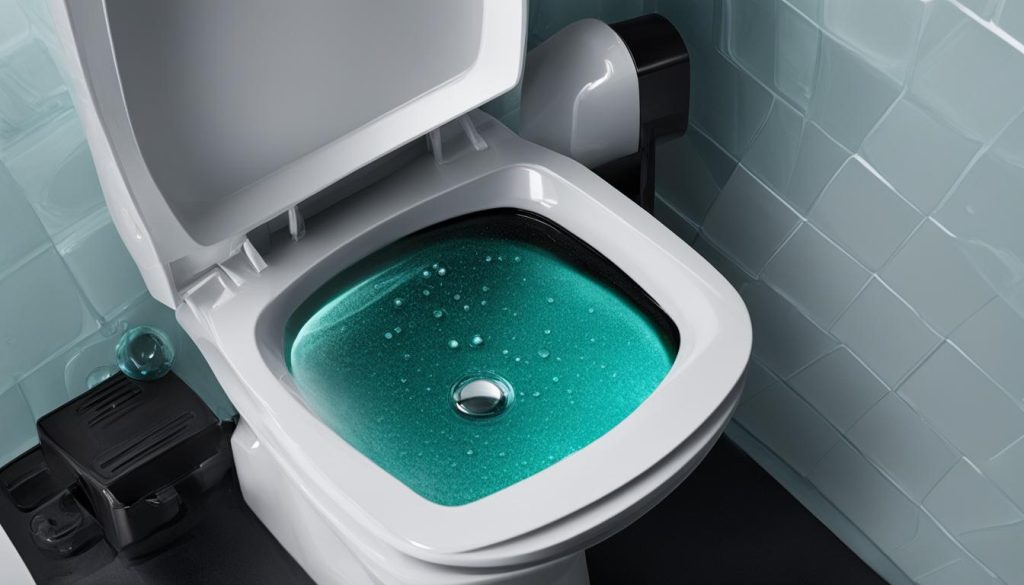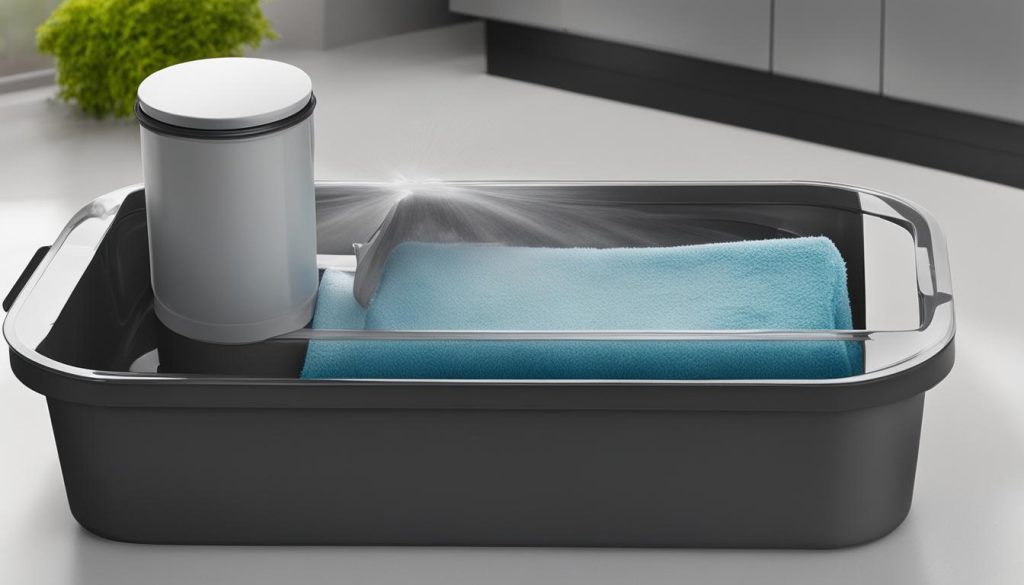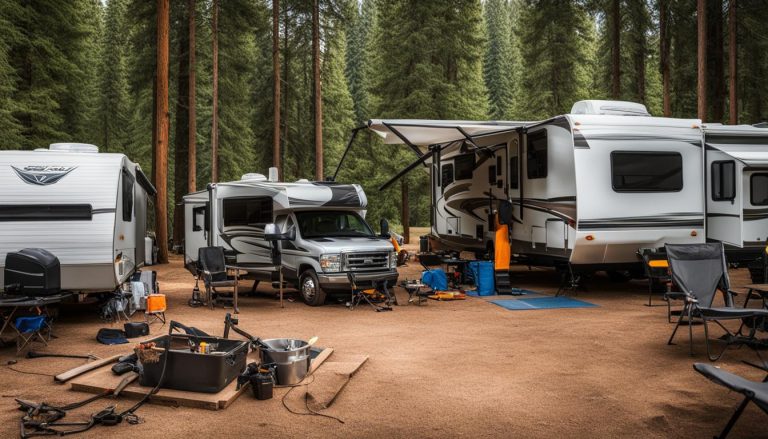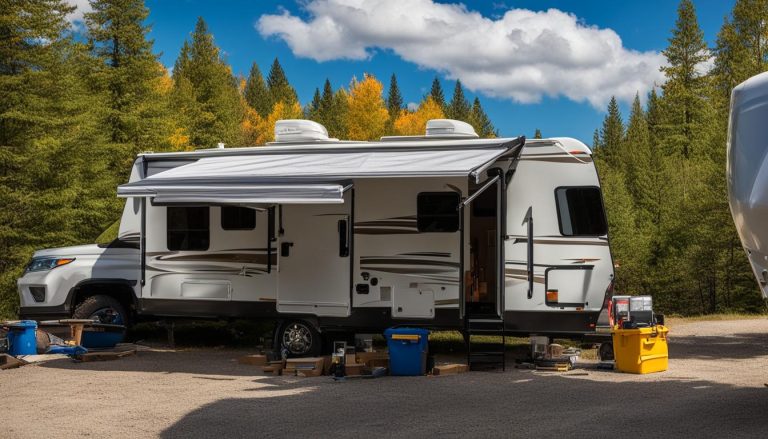Eliminate RV Sewer Smell Quickly & Effectively
gorvlifestyle.com and its partners may earn a commission if you purchase a product through one of our links
RVing is a great way to travel and explore, but dealing with the unpleasant smell from the RV sewer tank can be a challenge. However, with the right steps, you can easily eliminate RV sewer smell and enjoy a fresh and odor-free trip. In this section, we will provide you with effective tips and solutions to get rid of RV sewer smell, including preventing clogs, cleaning the tank, and maintaining your toilet.
Key Takeaways:
- Prevent clogs in your black water tank to avoid RV sewer smell
- Regularly refill the water in your tank to prevent it from drying out
- Add water with each flush of the toilet to ensure adequate liquid in the holding tank
- Use RV-grade toilet paper to prevent clogs and blockages
- Consider using specialized holding tank chemicals to break down waste and control odors
Refill the Water to Keep Things Flowing Smoothly
One of the key factors in preventing RV sewer smell is to ensure that your black water tank doesn’t dry out. To achieve this, it’s important to refill the water in your tank regularly. Adding enough water to cover the bottom of the tank is recommended to prevent the solid waste from drying out and causing unpleasant odors. By refilling the water in your tank, you can maintain the proper balance and prevent the onset of RV sewer tank odors.
How to Refill Water in Your RV Tank
Refilling the water in your RV tank is a simple process that can significantly contribute to preventing drying out and foul odors. Follow these steps to refill the water in your RV tank:
- Locate the water fill port on your RV.
- Connect a freshwater hose to a water source.
- Attach the other end of the hose to the fill port.
- Turn on the water supply and let it flow into the tank.
- Monitor the water level in the tank and stop filling when it reaches an appropriate level.
- Disconnect the hose and secure the fill port.
Remember to use a clean, potable water source for refilling your tank. This will ensure that your tank remains hygienic and free from contaminants.
The Importance of Preventing Drying Out
Allowing your black water tank to dry out can result in several issues, including the development of stubborn odors. Here’s why preventing drying out is essential:
- Prevents clogs: Dry waste is more likely to cause clogs in your RV’s plumbing system, leading to backups and potential damage.
- Reduces odors: When solid waste dries out, it releases unpleasant odors that can permeate your RV and make your trip uncomfortable.
- Maintains system effectiveness: A properly hydrated black water tank helps the waste treatment chemicals function optimally, effectively breaking down waste and controlling odors.
By refilling the water in your RV tank regularly, you can prevent drying out and keep your black water tank clean, odor-free, and functioning smoothly.
| Benefits of Refilling Water in Your RV Tank | Tips for Refilling Water in Your RV Tank |
|---|---|
|
|
Add Water With Each Flush and Black Water Tank Chemicals
Another crucial step in preventing RV sewer smell is to add water with each flush of the toilet. This simple practice helps ensure that there is enough liquid in the holding tank to control odors effectively. By adding water consistently, you maintain a proper balance in the tank, preventing waste from drying out and causing unpleasant odors.
Using RV-grade toilet paper is highly recommended when it comes to preventing clogs and sewer smells. Regular toilet paper can lead to blockages in the tank, exacerbating odor issues. RV-grade toilet paper is designed to dissolve easily, reducing the chances of clogs and maintaining a smooth flow in your RV’s waste system.
Additionally, utilizing holding tank chemicals specifically designed for RVs can further enhance odor control and cleanliness. These chemicals aid in breaking down the waste, controlling odors, and maintaining the overall health of your tank. Be sure to follow the manufacturer’s instructions when using these chemicals to maximize their effectiveness.
By adding water with each flush, using RV-grade toilet paper, and incorporating holding tank chemicals, you can effectively prevent RV sewer smell and maintain a fresh and odor-free environment throughout your RV travels.

Table: RV Toilet Paper Comparison
| Toilet Paper Brand | Features | Benefits |
|---|---|---|
| Campa-Thick | Biodegradable and septic-safe | – Dissolves quickly to prevent clogs – Gentle on the RV plumbing system – Eco-friendly choice |
| Soft-Ride Essentials | 2-ply thickness | – Provides a soft and comfortable feel – Dissolves rapidly to prevent blockages – Safe for RV toilets and septic systems |
| Marine Masters | Strong and absorbent | – Breaks down easily to avoid clogs – Suitable for all RV toilet types – Delivers reliable performance |
Preventing and Cleaning Clogs
Clogs in the black water tank can be a common cause of RV sewer smell. To prevent clogs, it’s important to use RV-grade toilet paper that is designed to dissolve easily. Regular toilet paper can lead to blockages and unpleasant odors.
If a clog does occur, it can usually be identified when you are unable to empty the tank. In this case, you can attempt to clean the clog yourself by using various methods like using a hose or a bendable tube to push the clog through.
However, if the clog persists or is particularly stubborn, it may be necessary to seek professional help to clean the black water tank thoroughly.
RV Toilet Paper Recommendations
Choosing the right toilet paper for your RV is crucial in preventing clogs and maintaining a clean and odor-free black water tank. RV-grade toilet paper is specifically designed to dissolve quickly and easily in water, reducing the risk of blockages. Look for brands that are labeled as RV-friendly or septic-safe, as they are formulated to break down rapidly in the holding tank.
Tips to Clean a Clogged Black Water Tank
If you encounter a clogged black water tank, there are several steps you can take to clean it:
- Flush with plenty of water: Start by flushing the tank with a large amount of water to help break down the clog. You can use a garden hose or a flexible tank wand to reach the toilet.
- Apply gentle pressure: If the clog is stubborn, you can try using a hose or a bendable tube to apply gentle pressure to the clog. Be cautious not to use excessive force, as it may damage the tank or plumbing system.
- Use tank cleaning products: There are specialized tank cleaning products available in the market that can help dissolve clogs and eliminate odors. Follow the instructions on the product packaging for the best results.
In some cases, professional assistance may be required to thoroughly clean a clogged black water tank. A professional RV maintenance service can use specialized tools and equipment to effectively remove the clog and restore proper functionality to your RV’s waste system.
Proper Waste Management for an Odor-Free RV Experience
Preventing clogs and cleaning a clogged black water tank are essential steps in maintaining an odor-free RV experience. By using RV-grade toilet paper, regularly flushing with water, and taking proactive measures to address clogs, you can ensure a clean and functional waste system.
Remember that proper waste management involves not only using the right products but also practicing responsible RVing habits. Avoid dumping anything other than human waste, water, and RV toilet paper into the black water tank. This will help prevent clogs and maintain a healthy and odor-free environment inside your RV.

Scour and Clean Your Tank
Cleaning the holding tank is an important aspect of maintaining a clean and odor-free RV waste system. To eliminate RV sewer smell, it is crucial to clean the tank thoroughly and remove any stuck-on material, especially from the sides of the tank where build-up can occur.
There are two options for cleaning your RV holding tank:
- Professional Cleaning: Hiring a professional RV maintenance service is a convenient and effective way to ensure a thorough cleaning of your tank. These experts have the knowledge and equipment to scrape off any accumulated waste and thoroughly clean the tank to eliminate odors.
- DIY Cleaning: If you prefer to clean the tank yourself, you will need some essential tools and supplies:
- Rubber Gloves: Protect your hands from any contact with waste materials.
- RV Tank Cleaner: Choose a high-quality tank cleaner specifically designed for RVs to effectively break down waste and remove odors.
- Hose and Nozzle: Use a hose with a powerful nozzle to flush out the tank thoroughly.
- Scrub Brushes: Select scrubs brushes with long handles to reach all areas of the tank, ensuring a comprehensive cleaning.
Step-by-Step Guide for DIY Cleaning:
Follow these steps to clean your RV holding tank and eliminate RV sewer smell:
- Prepare: Put on your rubber gloves and gather all the necessary cleaning supplies.
- Empty the Tank: Ensure that your RV is parked at an appropriate dumping station and follow the proper procedure to empty the tank completely.
- Fill the Tank with Water: Using a hose, fill the tank with clean water until it is nearly full. This will give you enough water to flush out the tank during the cleaning process.
- Add Tank Cleaner: Pour the recommended amount of RV tank cleaner into the tank. Follow the instructions on the product label for the correct usage and dosage.
- Scrub the Tank: Use the scrub brushes to scrub the interior walls and surfaces of the tank, paying extra attention to areas with stuck-on material or residue. Make sure to reach all corners and crevices to ensure a thorough cleaning.
- Flush the Tank: Attach the hose with a powerful nozzle to a water source and use it to flush out the tank, rinsing away any remaining cleaner and waste. Continue flushing until the water runs clear.
- Repeat if Necessary: If you notice any lingering odors or stubborn build-up, repeat the cleaning process until the tank is clean and odor-free.
- Dry the Tank: After cleaning and flushing, allow the tank to air dry completely before closing it off to prevent any moisture or mold growth.
By regularly cleaning your RV holding tank and removing stuck-on material, you can maintain an odor-free waste system and enjoy a fresh and pleasant RV experience.
A clean RV holding tank helps prevent RV sewer smell and ensures an odor-free waste system.
Clean the Toilet and the Flapper
If you’ve emptied and cleaned your black water tank but are still experiencing a lingering smell, it may be necessary to clean the toilet itself and the flapper. Any unpleasant residue or build-up can contribute to RV sewer smell. Cleaning both the toilet and the flapper thoroughly can help to eliminate any lingering odors and ensure that they function properly. If the flapper doesn’t close properly, it can allow the smell from the waste tank to fill your RV, so ensuring it is clean and functioning correctly is essential.
To clean the RV toilet, start by using a toilet cleaner or a mixture of baking soda and vinegar. Apply the cleaning solution to the inside of the toilet bowl and scrub with a toilet brush. Pay close attention to the areas under the rim and the bowl’s sides where residue can accumulate. Rinse the toilet thoroughly with clean water, ensuring all cleaning agents are removed.
Next, it’s important to clean the flapper. The flapper is responsible for regulating the flow of water into the toilet bowl and preventing RV toilet odors from escaping. Over time, the flapper can become dirty or damaged, compromising its functionality. To clean the flapper, turn off the water supply to the toilet and remove the lid of the toilet tank. Locate the flapper and inspect it for any visible signs of wear or debris. Gently clean the flapper with a soft cloth or sponge, removing any dirt or residue. If the flapper shows signs of damage, it may need to be replaced.
After cleaning the toilet and the flapper, flush the toilet and check for any remaining odors. If the odor persists, repeat the cleaning process or consider using a specialized RV toilet cleaner that targets odor-causing bacteria.
Regular maintenance is key to preventing RV toilet odor issues. Make sure to clean the toilet and the flapper regularly, following the manufacturer’s instructions for cleaning products and techniques. By keeping your RV toilet clean and the flapper functioning properly, you can enjoy a fresh and odor-free RVing experience.
Repair Work Needed
If you’ve tried all the previous steps to eliminate RV sewer smell but are still experiencing persistent odors, it may indicate a more serious issue with your black water tank or toilet. In this situation, it is highly recommended to seek professional help for repair work to address the underlying problems effectively.
Leaks or damage to the tank or toilet can lead to ongoing odor problems, compromising your overall RV experience. By promptly addressing these issues through professional RV maintenance and repair, you can restore your RV’s freshness and ensure an odor-free environment for your travels.
Professional technicians have the expertise to identify and resolve the root cause of the odor issues, which may involve RV sewage leak repair or replacement of faulty components. Their specialized knowledge and equipment allow them to conduct thorough inspections and make the necessary repairs and replacements, ensuring a lasting solution and preventing future odor-related problems.
By entrusting your RV’s repair work to professionals, you can have peace of mind knowing that the issues causing the persistent odor are being addressed comprehensively. Prioritizing professional RV maintenance and repair allows you to enjoy your adventures without the worry of unpleasant smells, enhancing your overall RVing experience.
FAQ
How can I eliminate RV sewer smell?
There are several steps you can take to eliminate RV sewer smell, including keeping the black water tank from drying out, adding water with each flush, using RV-grade toilet paper, and using holding tank chemicals. Cleaning the tank, toilet, and flapper can also help eliminate lingering odors. If the smell persists, it may be necessary to seek professional help for repair work.
How do I prevent my black water tank from drying out?
To prevent your black water tank from drying out and causing odors, it’s important to refill the water in the tank regularly. Make sure to add enough water to cover the bottom of the tank and maintain the proper balance of liquid in the tank.
What should I do to control RV sewer odors while flushing?
Adding water with each flush of the toilet is essential to control RV sewer odors effectively. This ensures that there is enough liquid in the holding tank to dilute and control the odors. Additionally, using RV-grade toilet paper that dissolves easily can help prevent clogs and further eliminate odors.
How can I prevent and clean RV toilet clogs?
To prevent RV toilet clogs and the accompanying sewer smells, it’s important to use RV-grade toilet paper that dissolves easily. Regular toilet paper can lead to blockages and unpleasant odors. If a clog does occur, you can try to clean it yourself using various methods like using a hose or a bendable tube to push the clog through. If the clog persists or is stubborn, seeking professional help to clean the black water tank may be necessary.
How do I clean my RV holding tank?
Cleaning your RV holding tank is crucial to maintain an odor-free waste system. Whether you choose to hire a professional or do it yourself, it’s important to clean the tank thoroughly, especially on the sides where stuck-on material may reside. This ensures the tank is free from build-up and eliminates RV sewer smell.
How can I keep my RV toilet and flapper clean?
Cleaning both the toilet and the flapper is essential to eliminate lingering odors. Any unpleasant residue or build-up can contribute to RV sewer smell. Thoroughly clean both the toilet and the flapper to ensure they function properly. If the flapper doesn’t close properly, it can allow the smell from the waste tank to fill your RV.
What should I do if RV sewer smell persists?
If you have tried all the previous steps and are still experiencing persistent RV sewer smell, it’s possible that there may be a more serious issue with your black water tank or toilet. In this case, it is recommended to seek professional help for repair work. Leaks or damage to the tank or toilet can lead to ongoing odor problems, and addressing these issues promptly is important.






